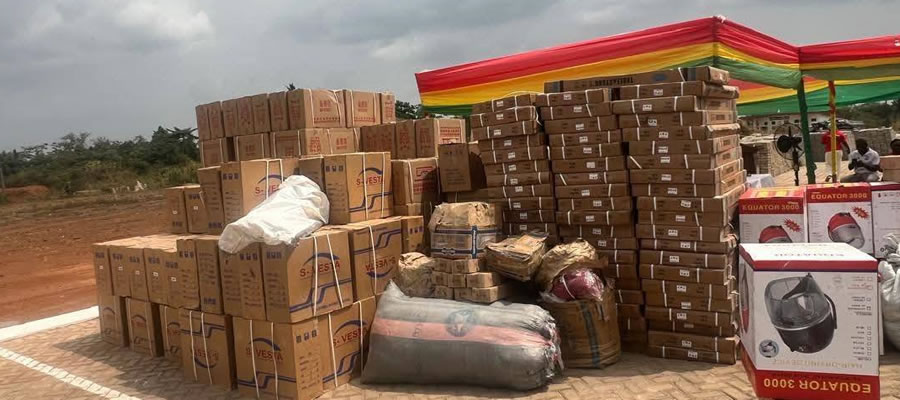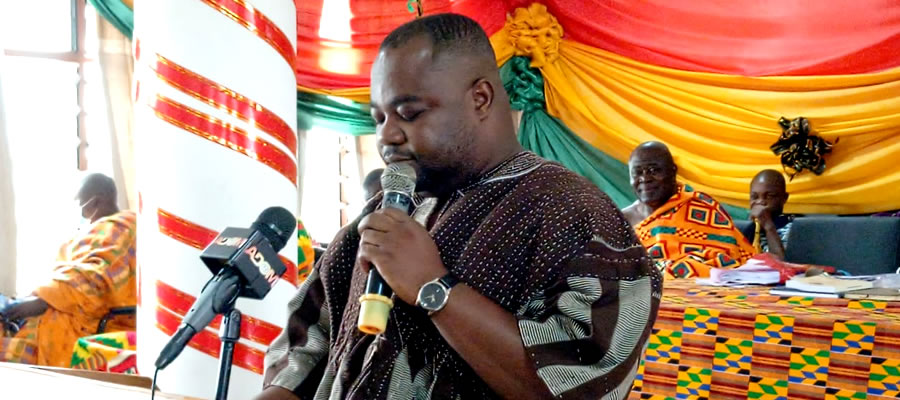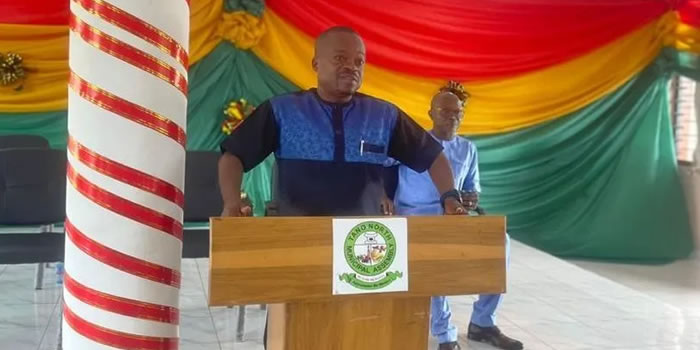

Political and Administrative Institutions
The development process in the Tano North Municipal is impinged upon by various institutional structures that include state institutions, traditional governance structures, the private sector and non-governmental organizations including community based organizations.
The Tano North Municipal Assembly is the overall governance authority and also responsible for development of the whole Municipal. Under local Government Act, 1993 (Act 462) the Assembly has deliberative, legislative and executive functions. It is the highest political administrative and planning authority at the Municipal level. The current Tano North Municipal has been part of the then Tano Municipal before its establishment. It was carved out of the Tano Municipal in 2004 with legislative instrument (LI) 1754 and has Duayaw-Nkwanta as its Administrative Capital.
The Municipal Chief Executive is the Political Head and works directly under the political and administrative jurisdiction of the Regional Minister. The Municipal Coordinating Director is the administrative head of the Municipal and is responsible for the day to day management of the Municipal. The Municipal Assembly also works closely with the following Departments and Agencies to provide technical support mainly for the implementation of government policies, programmes and projects;
• Central Administration
• Works
• Agriculture
• Social Welfare & Community development
• Environmental Health
• Physical planning
• Trade and Industry
• Education, Youth and Sports
• Disaster prevention and management
• Natural Resource conservation, forestry, game and wildlife
• Health
The Municipal has one Constituency with 25 Electoral Areas. The elected assembly members are twenty-five (25) and eleven (11) Government Appointees. To support the work of the Assembly’s Executive Committee there are nine Sub–committees as listed below:
• Development Planning
• Finance and Administration
• Social Services
• Works
• Justice and Security
• Women and Children
• Agriculture, Environment & Sanitation
• Small & Medium Enterprise
• Public Relations
The Sub-committees are to collate and deliberate on issues which are forwarded to the executive committee for action. The Assembly may also form any other committee that it deem necessary. The Co-ordinating Director is the secretary to the general House of the Assembly and she is supported by other technical and professional staff. There are also other government agencies in the Municipal which perform public service functions to the inhabitants.
These include National Commission for Civic Education, Municipal Electoral Office, Non-formal Education Division, National Service Secretariat and Judicial Service (Magistrate and Circuit Courts). These departments have offices in the Municipal whereas the Forest Services Division has their office in Bechem although they perform certain services to the Municipal. There are three security agencies in the Municipal thus the Police Service, Fire Service and Prisons Services. All these security agencies have their offices in Duayaw Nkwanta and Koforidua respectively. There is strong co-ordination between the Tano North Municipal Assembly and the departments to ensure that the inhabitants benefit from their services.
Sub-structures of the Assembly
There are two Town Councils, namely Duayaw-Nkwanta and Yamfo, and three Area Councils which are Bomaa, Terchire and Tanoso. The Town and Area Councils are responsible for sub-Municipal level planning, programming, implementation and evaluation of development activities. The effective operations of the Zonal Councils have been hampered by lack of offices, personnel and logistical support.
However not all the committees have full complement of members nor are functional. These gaps in the democratic structures imply that the Municipal Assembly members must play a key role in ensuring effective information flow between the Assembly and the grassroots. The evidence on participation and consultation from the field indicate that there exist large information and communication gaps.
The sub-Municipal structures are not able to perform their mandate as spelt out in the Local Government Act, they are unable to organize regular meetings due to unavailability of funds. In the case of revenue mobilization only one out of the five sub-structures (Duayaw NkwantaTown Council) are directly involved in revenue collection and therefore the rest do not get the needed funds to implement their own programmes. This has increased their dependence on the assembly to solve local problems. The effect is that governance at the Municipal level is still centralized with the grassroots still excluded in the governance process.
Human Resource Situation of the Assembly
Personnel of the Assembly
The human resource base of the Assembly is a key factor in the development of the Municipal. The availability of the required number of staff with the relevant qualification and competence will ensure efficient implementation of policies, programmes and projects to enhance the standard of living of the people. Table 1.16 presents data on the staff situation in the Municipal.
From Table 1.16, the Assembly has the required technical staff with the relevant skills and knowledge to efficiently implement national and local policies, programmes and projects for effective development of the Municipal. Specific training needs of staff of the departments of the Assembly would be handled at that level by management while the Assembly would consider critical but generic capacity requirements of management staff to increase output. It is therefore expected that each department would conduct its staff needs assessment and plan for them accordingly.
Participation, Consultation and Accountability
Participation has been defined as the process through which the individual plays a role in the political, economic and social life of his or her community or country. Through it the individual contributes to the setting up of general goals for society and is aware of the available opportunities that enable him or her to suggest the best solutions for achieving the goals.
The Assembly involves all relevant stakeholders throughout the planting and budgeting cycle. Article 240 (2)(d) of the 1992 constitution states that, “to ensure accountability of local government authorities, people in particular local government areas shall, as far as practicable, be afforded the opportunity to participate effectively in their governance”.
The incentives for citizens to participate in a given activity are deeply rooted in the peculiar physical, cultural, political and socio-economic circumstance in which they find themselves at a given time. Citizen’s participation in the Municipal depends among others on the incentives provided for them to participate as well as other factors like;
• The outcome of previous experience with participation in government sponsored activities.
• The political, religious affiliation or in some communities chieftaincy inclination and
• Conformity of the institution for channeling participation through recognized existing community institutions
Non-governmental Organisations and Civil Society play very important roles in the socio-economic development of the Municipal through their set activities. Participation by these stakeholders is manifest at the levels of information sharing, consultation, collaboration, partnership and empowerment. To ensure ownership of the Assembly’s development agenda it is necessary that avenues be created for stakeholders and other interested partners with contributions to get involved in the development effort. This is the effective way to generate true sustainability and public support for the development process.
The Municipal Assembly has therefore instituted channels for consultations with stakeholders at the Municipal, Area Council and Community levels. These include public fora, information dissemination, Town Council meetings and public education. These involve the Information Service Department and the National Commission for Civic Education as well as the Civil Society Organisations.
Date Created : 11/20/2017 7:12:04 AM












 facebook
facebook
 X
X
 Youtube
Youtube
 instagram
instagram
 +233 593 831 280
+233 593 831 280 0800 430 430
0800 430 430 GPS: GE-231-4383
GPS: GE-231-4383 info@ghanadistricts.com
info@ghanadistricts.com Box GP1044, Accra, Ghana
Box GP1044, Accra, Ghana